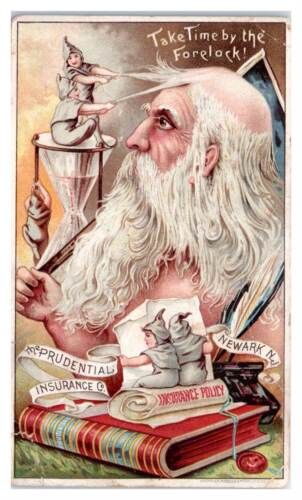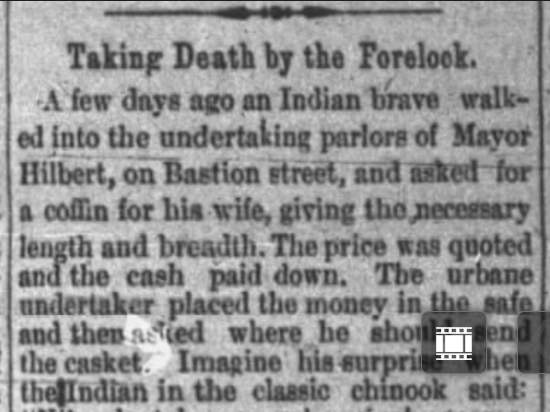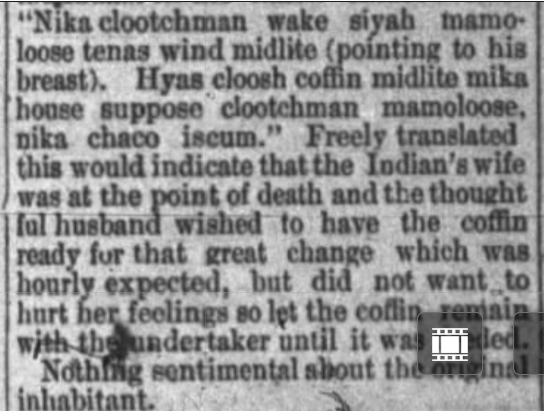1890: Taking Death by the Forelock in Nanaimo
The Settlers thought this humorous…

(Image credit: ebay)
I’m not sure the customer meant it to be.
Taking Death by the Forelock.
A few days ago an Indian brave walked into the undertaking parlors of Mayor Hilbert, on Bastion street, and asked for a coffin for his wife, giving the necessary length and breadth. The price was quoted and the cash paid down. The urbane undertaker placed the money in the safe and then asked where he should send the casket. Imagine his surprise when the Indian in the classic chinook said: “Nika clootchman wake siyah mamoloose tenas wind midlite (pointing to his breast). Hyas cloosh coffin midlite mika house suppose clootchman mamoloose, nika chaco iscum.” Freely translated this would indicate that the Indian’s wife was at the point of death and the thoughtful husband wished to have the coffin ready for that great change which was hourly expected, but did not want to hurt her feelings so let the coffin remain with the undertaker until it was [nee]ded.
Nothing sentimental about the original inhabitant.
— from the Nanaimo (BC) Daily News of October 14, 1890, page 1, column 5
And our customary deep dive into the Chinuk Wawa of these 4 clauses:
Nika clootchman wake siyah mamoloose[;]
nayka ɬúchmən wík-sáyá míməlus;
my woman not-far dead;
‘My wife is nearly dead;’
tenas wind midlite (pointing to his breast).
tə́nəs wín míɬayt.
little.bit wind stay.there.
‘Some breath is still in her.’
Hyas cloosh coffin midlite mika house[;]
hayas-ɬúsh kʰáfin* míɬayt Ø mayka háws;
very-good coffin be.there at your building;
‘It’s preferable the coffin stays at your place;’
suppose clootchman mamoloose, nika chaco iscum.
spus ɬúchmən míməlus, nayka cháku ískam Ø.
if woman die, I come fetch it.
‘If the wife dies, I’ll come fetch it.’
Quite fine BC Chinuk Wawa here, i.e. northern dialect as we’ve come to know it from large numbers of other sources.
- The speaker uses the northern pronunciation míməlus for ‘dead’, rather than the older/southern míməlust.
- A new borrowing of English coffin is in character for BC Jargon, which stuck with a rule of taking in new words if they were more specific than existing CW expressions for the same concept.
- The Native man uses both the “silent preposition” and the “silent it” direct object.
- He also has spus for ‘if’, which is very frequent in the northern dialect.
Bonus fact:
When you think about it, the frequent sense of ‘stay, remain’ for the “copula” verb míɬayt fulfils some of the function that’s expressed by the English adverb ‘still’.



Pingback: Function of CW’s “silent” PREPosition, and a possible source of it | Chinook Jargon